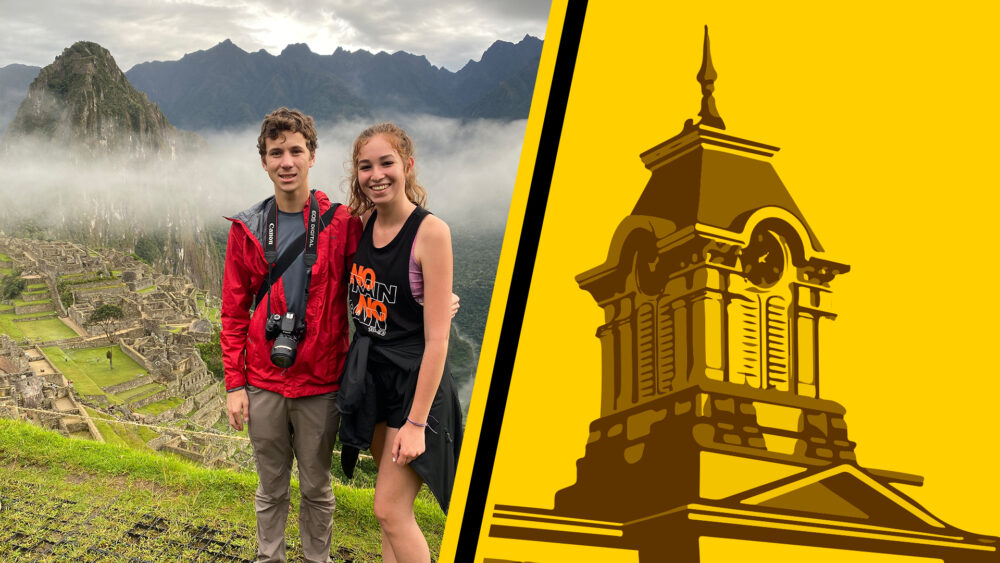
Matt Payne '22 and Gracie Willaert '21 above Machu Picchu in Peru.
Gracie Willaert had been awake for almost 36 hours when she finally broke down. Pent-up tension escaped one wracking sob at a time as she slumped against the bathroom wall. It was a tangled knot of emotions—sadness that her study away program had been cut short, gratitude for her Peruvian host family, uncertainty about the days to come, even guilt somehow, though she’d done nothing wrong. Most of all, she felt relieved.
As Willaert wiped away the tears, mind still racing, she didn’t think she’d be able to sleep. But even when the whole world is different, when it feels broken and unfamiliar in ways that you can’t quite explain, sometimes exhaustion wins.
It was Thursday, March 26. The Gustavus Adolphus College junior was home.
•••
Ten weeks earlier Willaert was en route to Peru, where she would study at Universidad San Ignacio de Loyola alongside fellow Gustie Matt Payne through a Center for International Studies (CIS) Abroad program. It was her first trip out of the United States, and the days leading up to her departure had been a blur for the Spanish and international management major as she packed, said goodbye to family and friends, and prepared for the semester in the Andes.
“I was really excited but also pretty nervous. I don’t think I realized until then that I’d be away from home for such a long time,” Willaert recalls. “It didn’t feel real until I was on the plane.”
A Gustavus sophomore majoring in environmental studies and Spanish, Payne decided to study abroad relatively early in his college career because he wants to be on campus his junior and senior years as a member of the College’s cross country and track and field teams.
When they arrived in Cusco in mid-January, the Gusties met their host families. Willaert was with Nancy and her husband Oscar, along with a fellow study away student from Maryland. Payne and three other students from the United States were paired with Sandro, Tania, and their children, Joaquin and Gabby. Willaert and Payne went to orientation, met the other students in their CIS Abroad program, and quickly settled into a routine.
Classes were Monday through Thursday, with field learning experiences on Wednesday mornings that connected the students with the people of Cusco and the surrounding area.
“We helped with upkeep at an orphanage, painted at a women’s shelter, and did some soccer field maintenance in a low-income community,” Payne says. “I remember hearing about coronavirus in China the first week or two of the trip, but it didn’t seem like a big deal.”
“When people talk about studying abroad, sometimes they think it’s like being on vacation everyday, but that’s not true,” Willaert explains. “You go to class, you eat with your family, and you do homework, all in a different language. You’re going to have good days and you’re going to have bad days. It’s real life.”
But there was time for a little fun, too. With breaks or field trips scheduled for Fridays, the students had three-day weekends to experience the culture of Cusco or take short trips to see other areas of Peru. They spent time eating and exploring the city, visited Machu Picchu, went hiking, and soaked in Andean hot springs.
“Coronavirus really came onto our radar midway through February,” Payne says. “We started to hear about college students in Europe and Asia who were being sent home. There were no cases in South America at that point, so things were still normal for us.”
“It started small—just a buzz on campus, seeing snippets on the news,” Willaert agrees. “Then everything went crazy the second week of March.”
On Thursday, March 12, Willaert went out to buy shampoo. People scurried frantically from aisle to aisle; the shelves quickly grew bare. The day before had seemed normal. For the first time, Willaert felt a twinge of panic.
When she got home, an email was waiting from Bryan Messerly, Interim Director of the Gustavus Center for International and Cultural Education (CICE). The U.S. Department of State had elevated the entire world to Global Health Level III advisory, triggering the College’s recall of Willaert, Payne, and a few dozen other Gusties from locations around the globe.
Payne called his parents, who had been visiting him in Peru and left the day before. “I guess I’ll see you sooner than we thought,” he told them.
“The first thing I did was call my dad and tell him I was coming home,” says Willaert. “But then my thoughts went to my host mom.” Nancy and Oscar’s daughter, Maria, was close in age to Willaert and had recently left for a trip to Australia. “Nancy was worried about her daughter so it was a nice distraction for her to have us there. Then all of a sudden we had to tell her we were leaving.”
Back on campus, College staff had been monitoring developments across the globe for weeks, tracking travel advisories and program alerts while talking regularly with students. Gustavus started the semester with 41 students studying around the world. By the time the College called everyone back on March 12, Gusties from southern Europe, South Korea, and Japan were already dealing with program cancellations and booking flights. A few were already home.
After Messerly sent his message to all the study away students, the next three days were a blur of tracking and verifying each student’s travel plans. With student wellbeing the College’s primary concern, the administration decided right away to provide support for additional travel expenses. Willaert and Payne had managed to book flights home for Wednesday, March 18. To the CICE team, it seemed like everything was on track for the Gusties in Peru.
“Nobody in the study away field wants to bring students home early because we know that these experiences abroad are transformative and mean so much to our students,” Messerly says. “But by the time the State Department announced an unprecedented worldwide Level III advisory, we knew that the only choice was to bring everyone home.”
For Willaert and Payne, the days after the announcement passed in a fog. They had one last dinner with other students from their CIS Abroad program and attended a hastily planned closing ceremony at the Universidad. On Sunday, March 15, Willaert met other students to get ice cream from their favorite local shop. Payne went for a hike. That night, Peruvian President Martín Vizcarra gave a televised address about the country’s response to coronavirus.
“My Spanish is good, but I still have trouble keeping up when a native speaker is talking fast,” Willaert recalls. She caught snippets here and there. Her phone started buzzing with messages from other students in the program. Concerned, she asked her host parents for clarification. They tried to calm her down.
Peruvian borders would be closed effective Monday night, Vizcarra announced, and the country would be ordered to shelter in place except for essential trips for medical care or groceries. Anyone in public would be required to wear a mask and show identification, and there would be stiff penalties for rule breakers. For Willaert and Payne, the decree meant one thing: their flight home was canceled.
The next day, they received an email from the U.S. Embassy in Lima. Stay where you are as long as you’re safe, the message said. The government was working on a plan to get thousands of United States residents home.
Willaert and Payne waited, confined to their host families’ homes. There wasn’t much to do besides paperwork. They filled out forms for the U.S. Embassy. Then the Peruvian government. Then a form for an airline that might be able to help. Then another.
“I was lucky to be with three other students, so at least we had each other to talk to,” Payne says. “And we were in a safe place with a family that was taking care of us.”
Messerly checked in by email daily and by phone almost as often.
“There was little that I or anyone at Gustavus could do to get Gracie and Matt out of Peru after the borders closed—only the Department of State working with the Peruvian government could clear the logjam,” Messerly recalls. “I wanted Matt and Gracie to know that we would be there for them as long as it took to get them home.”
By Friday, March 20, word had leaked out that Peru would further limit the number of flights in and out of the country. There was talk of a hard deadline, but it was unclear whether there would be enough flights for everyone who needed to leave.
Willaert and Payne and their families reached out to elected officials. Back home, the Gustie network lit up. A Gustavus administrator contacted State Representative Jeff Brand (19A), who started making calls. His colleague, Rep. Michelle Christensen (39B) got involved. In Washington D.C., a young alum’s phone chirped with a text message from campus; a staffer for Senator Amy Klobuchar, he made a connection by email. Senator Tina Smith’s office stepped in. After getting word about the Gusties, an aide for U.S. Representative Jim Hagedorn (MN-01) contacted Willaert directly.
On Monday, March 23, Willaert and Payne received an email from the U.S. Embassy. They were on the next flight out. The Gusties packed their bags. More bad news came on Tuesday. There was a bureaucratic tangle up somewhere along the line and the plane that was coming for them was refused clearance to enter Peruvian airspace. As the flight turned back, the Gusties learned they’d have to wait another day. Sit tight, the message instructed, wait for further details.
That night, still nothing in her inbox, Willaert fell into a fitful sleep. She awoke early on Wednesday to her host mother frantically knocking on her bedroom door. The email had finally come late the night before. It was time to go.
“We had to leave so fast that we barely had time to say goodbye,” Payne explains.
The Gusties got sunburns on the tarmac waiting for the plane. The flight was scheduled to go from Cusco to Lima to Miami.
Willaert remembers standing there, wondering if they were really leaving. “What if the border was closed? What if we got stranded somewhere else? I always felt safe with my host family in Cusco, but now we were on our own.”
When they landed in Miami and turned on their phones, the first message was from Messerly. Do you need anything, he asked, can I book hotel rooms for you? Willaert and Payne got into Miami late and their flight to Minneapolis was early. Tired of logistics and barely able to believe that they were back in the United States, they declined the offer. The Gusties stayed up all night in the airport talking about their experience.
They arrived in Minneapolis at noon on Thursday, March 26. It had been 10 days since Peru closed its borders.
•••
“It’s nice to go outside, go for a run and stuff like that, but I have complicated feelings,” Payne says from his home in Stillwater, Minn. “I’m glad to be home with my family, but I can’t help but feel like I didn’t accomplish what I set out to do this semester. I was really connecting with the place and then it all disappeared.”
“I know that all our students who had to return early are dealing with a sense of lost opportunities and a range of conflicting emotions. I’m profoundly impressed by the grace, courage, and maturity that they all exhibited in facing this generation-defining moment,” Messerly says. “When we send students out into the world, I hope that they return more resilient, adaptable, and self-assured. These Gusties may not have accomplished everything that they expected, but they were tested unlike any other group of study away students since at least 9/11, and I’m proud of how they stepped up and overcame serious obstacles.”
Like many of us, Willaert is still adjusting to the shifting uncertainties of the COVID-19 pandemic. But there is at least one thing that she is sure about: the importance of people who care.
“I was scared sometimes, but my communities in Peru, at home, and at Gustavus took care of me. Seeing so many people step up to make a difference is really inspiring,” she says.
“It’s okay to be sad about what happens, but it’s really important to be grateful for what we have.”
###
Media Contact: Director of Media Relations and Internal Communication Luc Hatlestad
luch@gustavus.edu
507-933-7510
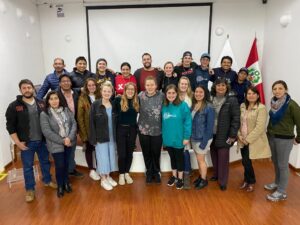
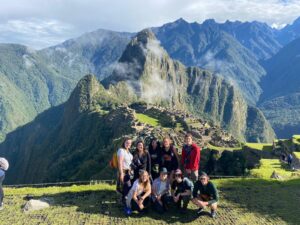
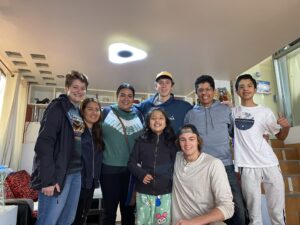
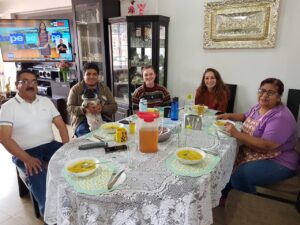
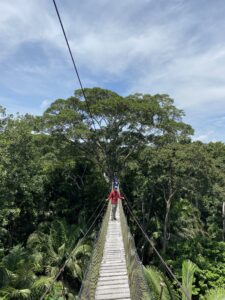
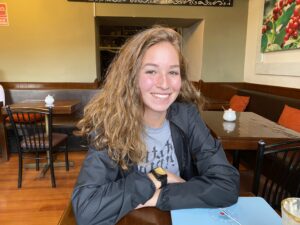
What a story! I marvel at your strength, courage, and perseverance. For sure you make everyone involved so proud of how you handled yourself, and how appreciative you were of those that provided your rich experience and surrounded you with love and security. My heart raced as I read your story. I’m so thankful you are safe and at home with your families.
Wow!! Thanks for sharing this story and your photos, Gracie and Matt. You are right to have mixed emotions of what you’ve been through these past few weeks. Yet, you’ve made connections with caring people in another country during this stressful time, what you and your host families have been through will be remembered forever. I am so happy to read of your maturity, to above all…count your blessings. Glad you’re home, take care!
Yes, thanks for sharing, Gracie and Matt. Your story made me remember everything that is special about studying away, as well as the intentionality of those that do so. Thank you, JJ, for a stirring article that provided such a great glimpse into their experience.
It’s a blessing to hear your story, Gracie and Matt (thanks, JJ). This will be a defining life moment for you….knowing you got through this will give you strength for years to come. And, knowing that you had so many people rooting for you – that in itself is overwhelming in the best way! By the way, I was glad to see you made it to Machu Picchu!